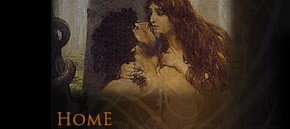About
Fairy tales

Many writers have certain genes in their DNA. We're the kids who always have their nose in a book, who live in the library (my first paying job was as a pageyes, a page in the library), are loners, and inordinately fond of fairy tales. I grew up reading my oldest sister's gigantic Golden Book of Fairy Tales until it fell apart. I loved the book because it had fairy tales that I'd never read before, like "Bright, Deardeer and Kit" and Japanese fairy tales (growing up half-Japanese without seeing any references to Japanese stories, this seemed very enlightened to me). I also loved the slightly horrible things kept in those translations, like how frogs and snakes would fall from a villain's lips whenever she (the main characters were often female, another plus) told a lie. Once we'd all grown up, my oldest sister decided she wanted it back. I pined for it and thought I'd never find it again, but to my delight my husband had a copy from his childhoodin pristine condition! It's one of my prized possessions.
There's a folktale at the heart of The Taker. Can you guess which it is? The answer is at the bottom of this page.
Colonial American influence
Although I was born in Alaska, I grew up in a small town in Massachusetts very near the famously historic town of Concord. I didn't think I was particularly susceptible to the colonial influence or was a history buff in general, but apparently it seeped into my subconscious. Everywhere you turn in that part of Massachusetts, there are historical landmarks (the Old Manse, the Old North Bridge, battlefields, cemeteries) and just plain old houses that people live in. It was part of our everyday; you couldn't get away from it. It also probably didn't hurt that I'm a fan of Nathaniel Hawthorne, either.
Is that your real name?
When I was growing up, no one had the name "Alma." Maybe Civil War widows. The only other Alma I'd heard of was someone's grandfather (it's the name of a Mormon elder, I've been told). I was named after an aunt that everyone loved but who died young. It was not the kind of name a girl wants, at least not at the time I was a little girl. It was ugly and peculiar and too easy to make fun of. I wanted a pretty, feminine name. I'm still not crazy about it, even if it is less uncommon (thanks Anne Proulx, who put two Almas in "Brokeback Mountain," and Nicole Krauss, two Almas also in The History of Love.) Nonetheless, I don't think Alma will make it on the list of top baby names any time soon. Or ever.
Katsu is Japanese. It's my husband's family name; he's half-Japanese. So am I, but on my mother's side. Because I don't look particularly Asian, I always felt that side of me was hidden, so it's nice to have my husband's name to point to, like having a card that shows I'm part of the club.
Things that, impossibly, go together
As I mentioned, my mother is Japanese and was raised Buddhist. She didn't raise us to be Buddhist, but we absorbed notions about her beliefs; it would've been impossible not to. The thing is, I went to a Catholic school. As a child, I wasn't one to question inconsistencies; I didn't even see the inconsistencies between Catholicism and Buddhism and, to their credit, the priests and nuns never tried to "correct" my thinking about, say, reincarnation (though they were probably mightily confused.)
So, while it might annoy some people that I've conflated alchemy, religion and magic, to me it seems perfectly natural. To draw hard distinctions between notional things is folly, in my mind; well, you can draw distinctions for yourself but it would be futile to try to get everyone else to adhere to your beliefs. One person's religion is another person's magical delusion. One person's science is another person's magic. And, of course, some people treat religion as a science as opposed to philosophy or, say, fiction. While I'm a fan of fantasy, I've never been a believer in delusion. (Which, by the way, is why you won't find specific details of the spells and elixirs in the novel. I don't want anyone ingesting newt's eye or mandrake root on my say so.)
Pinocchio
Yes, that's the folktale lurking in the shadows in The Taker. Like Pinocchio, it's a story about growing up; Lanny's journey is about changing from being selfish and insecure to taking responsibility for her actions and putting someone else's wishes before her own- becoming a "real woman" in the way that Pinocchio sought to become a "real boy". In Chapter 15, when the coach draws alongside Lanny and she meets the evil three, I wanted the scene to be reminiscent of Mr. Fox and Mr. Cat tempting Pinocchio to be irresponsible. And lastly, the description of the attic space where Uzra hides from Adair was meant to evoke the belly of the whale that swallows Pinocchio and Gepetto.




